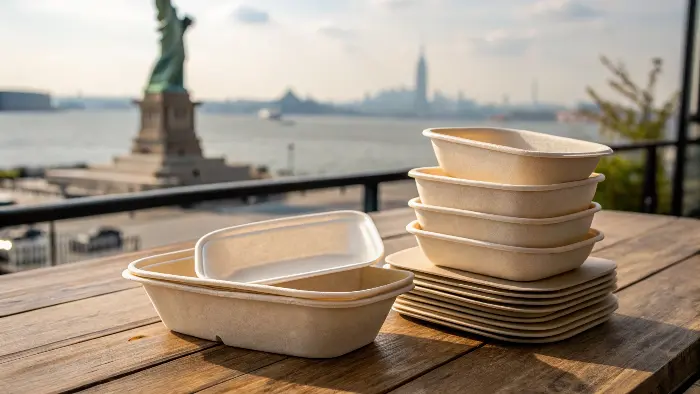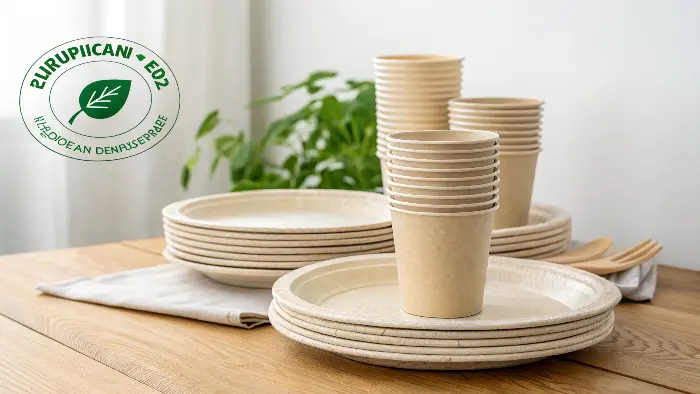Feeling overwhelmed by eco-tableware rules? You want to do right by the planet, but compliance is a minefield. Let us help you make sense of it.
Simply put, understanding biodegradable tableware regulations means checking specific rules for each target market, focusing on material composition, compostability certifications, and labeling. It’s not a one-size-fits-all situation, believe me.
It’s a wild world out there when it comes to rules for biodegradable stuff. You think you’ve got it figured out for one country, and then BAM! – another one has a completely different idea. It’s enough to make your head spin, right? But don’t throw in the towel just yet. We’ve been through this maze countless times with clients, and I want to share some of what we’ve learned. Stick with me, and let’s break this down so it’s less of a headache and more of an opportunity to shine with your sustainable choices.
Why Are Global Biodegradable Tableware Regulations So Darn Complicated Anyway?
Ever feel like you need a PhD just to import eco-friendly plates? You’re not alone. These regulations are complex, varying wildly. But there’s a reason for the madness!
The complexity stems from different national priorities, waste management infrastructures, and definitions of "biodegradable" or "compostable." It’s a patchwork, not a unified global standard, unfortunately.
Honestly, trying to find a single, global rulebook for biodegradable tableware is like searching for a unicorn – it just doesn’t exist. I remember when we first started Ecosourcecn, we thought, "Surely, ‘eco-friendly’ means the same thing everywhere?" Oh, how naive we were! Different countries have totally different setups for dealing with waste. Some have amazing industrial composting facilities, so they’re happy with materials like PLA that need specific conditions. Others? Not so much. They might be pushing for home compostable items or even just clearer labeling to avoid "greenwashing." Then you’ve got varying definitions. What one country calls ‘biodegradable’, another might scoff at. And don’t even get me started on how new materials and scientific understandings constantly shift the goalposts! It’s a moving target. For someone like Jacky, who’s trying to source for Canada, understanding these nuances isn’t just about ticking boxes; it’s about ensuring the products genuinely align with both Canadian environmental goals and consumer expectations. It’s a lot, I know, but that’s why we dig deep into this stuff.
Key Factors Making Regulations Complex:
- Varying Waste Infrastructure:
- Industrial Composting Availability: Impacts acceptance of materials like PLA.
- Home Composting Prevalence: Drives demand for different certifications.
- Defining "Eco-Friendly":
- Biodegradable vs. Compostable: Often used interchangeably but have distinct meanings and testing requirements.
- Material Source: Renewable resources vs. fossil fuels, even for some "biodegradable" plastics.
- National vs. Regional Priorities:
- Focus on Marine Litter: Some coastal nations are stricter.
- Landfill Diversion Goals: Drives different policy approaches.
- Consumer Protection: Preventing misleading "green" claims.
It’s a real patchwork quilt, and keeping up feels like a full-time job sometimes – which, well, for us, it kind of is!What Key Certifications Should You Look For in North America (USA & Canada)?
So you’re targeting North America, smart move! But what stamps of approval actually matter for your biodegradable tableware there? It can feel like alphabet soup sometimes.
For the USA and Canada, look for ASTM D6400 for industrial compostability. BPI certification is widely recognized in the US. Canada often aligns, but check provincial specifics too!

Alright, let’s talk about North America – a big market with big opportunities, but you gotta know the score with certifications. For Jacky in Canada, and for anyone looking at the US, the big one to remember is ASTM D6400. This standard is all about whether a product will break down properly in a commercial or municipal composting facility. Think of it as the gold standard for industrial compostability over there. Now, in the US, the Biodegradable Products Institute (BPI) is a huge player. They certify products that meet ASTM D6400. Seeing that BPI logo? That’s a pretty good sign for the American market. I’ve had clients who initially skipped this, thinking a general "biodegradable" claim was enough, and oof, they ran into issues with savvy retailers and consumers. Canada often looks to similar standards, but it’s super important to remember that provincial regulations can add another layer. For example, some municipalities might have specific requirements for their green bin programs. We always tell our clients, especially those like Jacky who are deeply invested in true sustainability, that it’s not just about getting any certification, but the right one for where your product will end up. It’s about credibility and making sure your eco-claims hold water.North American Certification Snapshot:
Certification/Standard Region Focus Key Takeaway Why it matters for Jacky? ASTM D6400 USA & Canada Standard specification for labeling of plastics designed to be aerobically composted in municipal or industrial facilities. Foundation for compostability claims. BPI Certified Primarily USA Third-party verification of ASTM D6400 compliance. Widely recognized. Builds trust with US consumers and B2B partners. BNQ Certified Canada Quebec-based certification for compostable plastics (CAN/BNQ 0017-088). Important if targeting Quebec or seeking broader Canadian acceptance. FDA / CFIA USA / Canada Food contact safety (not specific to biodegradability but crucial for tableware). Ensures products are safe for their intended use. Honestly, I always advise double-checking local and provincial rules. We had a case with a client exporting to Vancouver, and they had very specific guidelines for their city’s composting program. So, details matter!
How Do European Union Regulations (like EN 13432) Impact Your Biodegradable Tableware Choices?
Ah, Europe! Often seen as leaders in green initiatives, but their rules for biodegradable tableware can be a real maze. Heard of EN 13432? You should have!
EN 13432 is THE European standard for industrially compostable packaging. If you’re aiming for the EU market, compliance with this is pretty much non-negotiable for compostability claims.

Okay, if North America has its complexities, Europe takes it to another level – but in a good, structured way, mostly! The big kahuna here is EN 13432. This is the harmonized European standard that lays out the requirements for packaging recoverable through composting and biodegradation. If your biodegradable tableware is going to the EU and you want to claim it’s compostable, it absolutely must meet EN 13432. I can’t stress this enough. It covers things like disintegration (breaking down into small pieces), ultimate biodegradability (how much converts to CO2), heavy metal content, and even plant eco-toxicity tests on the final compost. It’s thorough! Beyond EN 13432, you also have to watch out for the Single-Use Plastics Directive (SUPD). This has been a game-changer, banning certain single-use plastic items outright – even some biodegradable plastics if they don’t fit specific exemptions or meet very strict criteria. For a buyer like Jacky, understanding this isn’t just about compliance; it’s about future-proofing. The EU is often ahead of the curve, so their regulations can signal where other regions might be heading. We’ve helped so many businesses re-evaluate their material choices for the EU market because of these stringent rules. It often means looking at things like bagasse or specific types of PLA that hold up to scrutiny.Key EU Considerations:
- EN 13432 Requirements:
- Disintegration: >90% of material must pass through a 2mm sieve after 12 weeks.
- Biodegradability: >90% biodegradation (conversion to CO2) within 6 months.
- Chemical Composition: Limits on heavy metals and fluorine.
- Ecotoxicity: No negative impact on plant growth from the resulting compost.
- Seedling Logo (TÜV Austria / DIN CERTCO):
- These are common certification marks indicating EN 13432 compliance. They are super recognizable.
- Single-Use Plastics Directive (SUPD):
- Bans on certain items (e.g., plastic cutlery, plates, straws unless specifically exempted).
- Marking requirements for some items.
- Increased Extended Producer Responsibility (EPR) schemes.
I always tell people, if you can meet EU standards, you’re generally in a very strong position globally. But boy, oh boy, the paperwork can be intense! Worth it in the long run, though.What About Biodegradable Tableware Rules in Asia and Australia – Any Surprises There?
Thinking of expanding to Asia or Down Under? Great markets, but their approach to biodegradable tableware can have its own unique twists and turns. Don’t assume it’s like Europe or North America!
Asia is a mixed bag: Japan has specific marks (e.g., GreenPla), China is developing its standards, and Australia has its own compostability schemes (AS 4736 for commercial, AS 5810 for home).

Now, let’s hop over to Asia and Australia. This is where things get really diverse! You can’t just paint these regions with one brush. In Australia, they’re quite serious about their compostability standards. They have AS 4736, which is for commercial composting – quite similar in rigor to EN 13432. Then there’s AS 5810, which is a big one because it’s for home compostability. That’s a different ball game, as home compost conditions are much less controlled than industrial ones. We’ve seen a growing demand from Australian clients for products meeting AS 5810, especially for consumer-facing items.
Then you look at Asia, and it’s a real patchwork. Japan has been a leader in bioplastics for a while, and they have marks like the "GreenPla" and "BiomassPla" to identify certified products. They’re very focused on accurate labeling. China is a massive market, and they’re rapidly developing their own national standards (GB/T standards) for biodegradable materials. The landscape there is evolving super fast, so staying updated is crucial. We had a client who wanted to source biodegradable packaging for the Chinese market, and we had to do a deep dive into the latest draft standards to ensure their chosen material would likely comply once finalized. It’s proactive work. Other Southeast Asian countries are also starting to implement their own regulations, often driven by plastic waste concerns. For someone like Jacky, exploring these markets means diligent, country-specific research. You can’t assume what works in Canada will fly in Singapore or Sydney. It’s about being adaptable and doing your homework!Quick Glance: Asia & Australia
- Australia:
- AS 4736: Standard for commercial/industrial compostability.
- AS 5810: Standard for home compostability (big plus for consumers).
- ABA (Australasian Bioplastics Association): Verification scheme similar to BPI or TÜV.
- Japan:
- JBPA (Japan Bioplastics Association): Issues "GreenPla" and "BiomassPla" marks.
- Focus on clear definitions and sourcing of biomass.
- China:
- GB/T Standards: National standards for biodegradable plastics are being actively developed and rolled out.
- Market is huge and dynamic. Watch this space!
- South Korea & other ASEAN nations:
- Increasingly adopting regulations, often influenced by EU/US models but with local adaptations.
It really highlights how a global business like Ecosourcecn needs to be on its toes. We’re constantly tracking these changes to make sure we can guide our partners effectively.How Can Working with a Knowledgeable Supplier Simplify Navigating These Tricky Regulations?
Feeling like you need a personal guide through this regulatory jungle? Well, partnering with the right supplier can feel exactly like that – a huge relief!
A knowledgeable supplier acts as your compliance partner, pre-vetting materials, providing documentation for certifications (EN13432, ASTM D6400, FDA), and guiding you through regional specifics. It saves you time and costly mistakes!

Okay, so we’ve established that these regulations are, frankly, a bit of a beast. This is where having a supplier who’s more like a partner – someone like us here at Ecosourcecn – really makes a difference. I mean, imagine Jacky trying to figure out the nitty-gritty of EN13432 while also designing new packaging and managing his existing product lines. It’s too much! A good supplier, one who’s truly specialized in eco-friendly products, isn’t just selling you items; they’re providing a compliance solution. We spend a ton of time vetting materials and our manufacturing partners. We make sure they have, or can achieve, key certifications like ASTM D6400 for North America, EN 13432 for Europe, and understand food safety like FDA or LFGB. When a client comes to us, say, wanting to launch a new line of PLA cutlery in Germany, we already know the questions to ask and the documentation they’ll need. We can say, "Okay, for Germany, you’ll need EN 13432, and here’s how we ensure our PLA meets that. Let’s also discuss the SUPD implications." It’s about proactive guidance. We’ve seen folks try to go it alone, and sometimes they end up with products they can’t sell in their target market, or worse, face fines. That’s a nightmare scenario we help our clients avoid. It’s not just about products; it’s about expertise and peace of mind.What to Expect from a Great Eco-Supplier:
- Increasingly adopting regulations, often influenced by EU/US models but with local adaptations.
- Deep Material Knowledge: Understanding the pros and cons of PLA, bagasse, CPLA, kraft paper, etc., in relation to regulations.
- Certification Support:
- Providing existing certification documents.
- Guiding on how to obtain product-specific certifications if needed for private label.
- Regulatory Updates: Keeping you informed about changes in key markets.
- Logistical Expertise: Navigating import/export rules related to these specialized goods.
- Customization within Compliance: Helping you design products that are both unique and meet standards. For example, ensuring inks used for branding are also compostable.
Think of it this way: you’re an expert in your brand and market; we’re experts in sustainable sourcing and compliance. Together, we can make a much bigger, and much smoother, global impact. 🔥Conclusion
Navigating biodegradable tableware regulations is complex but crucial. Partnering with experts can simplify compliance and ensure your sustainable choices truly make a global impact.


